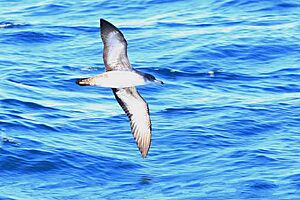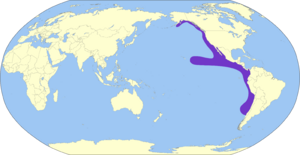Pink-footed shearwater facts for kids
Quick facts for kids Pink-footed shearwater |
|
|---|---|
 |
|
| Conservation status | |
| Scientific classification |
|
| Kingdom: | Animalia |
| Phylum: | Chordata |
| Class: | Aves |
| Order: | Procellariiformes |
| Family: | Procellariidae |
| Genus: | Ardenna |
| Species: |
A. creatopus
|
| Binomial name | |
| Ardenna creatopus (Coues, 1864)
|
|
 |
|
| Script error: The function "autoWithCaption" does not exist. | |
Script error: No such module "Check for conflicting parameters".
The pink-footed shearwater (Ardenna creatopus) is a type of seabird. It gets its name from its pink feet. This bird is about 48 centimeters (19 inches) long. Its wings can spread out to about 109 centimeters (43 inches).
Some pink-footed shearwaters have darker feathers, while others have lighter ones. This is a natural difference within the species. The pink-footed shearwater is very similar to the flesh-footed shearwater. Scientists are even studying if they might be the same species.
Where They Live
The pink-footed shearwater lives in the Pacific Ocean. It spends most of its life flying over the open ocean. These birds mainly build their nests on islands off the coast of Chile. One important nesting spot is Mocha Island.
After their young birds are grown, they fly north. They travel all the way to the cooler waters near the Arctic. This long journey is called a migration. During the warmer months, you can often see them off the West Coast of the United States.
What They Eat
Pink-footed shearwaters are skilled hunters in the ocean. They mainly eat fish, squid, and small sea creatures called crustaceans. They dive into the water to catch their food.
Life Cycle and Nests
These birds build their nests in burrows. They like to dig these burrows on forested slopes. Many pink-footed shearwaters nest together in large groups. This is called nesting in colonies.
Protecting Pink-Footed Shearwaters
The number of pink-footed shearwaters has gone down. This is partly because of animals like rats and cats. These animals were brought to the islands where the birds nest. They sometimes eat the eggs or young birds.
Another problem is fishing gear. Some shearwaters get caught in fishing nets or lines. This can harm or kill them.
Because of these threats, the pink-footed shearwater is a protected species. It is part of an important agreement called the Agreement on the Conservation of Albatrosses and Petrels. This agreement helps protect seabirds like the shearwater around the world.
 | Audre Lorde |
 | John Berry Meachum |
 | Ferdinand Lee Barnett |


